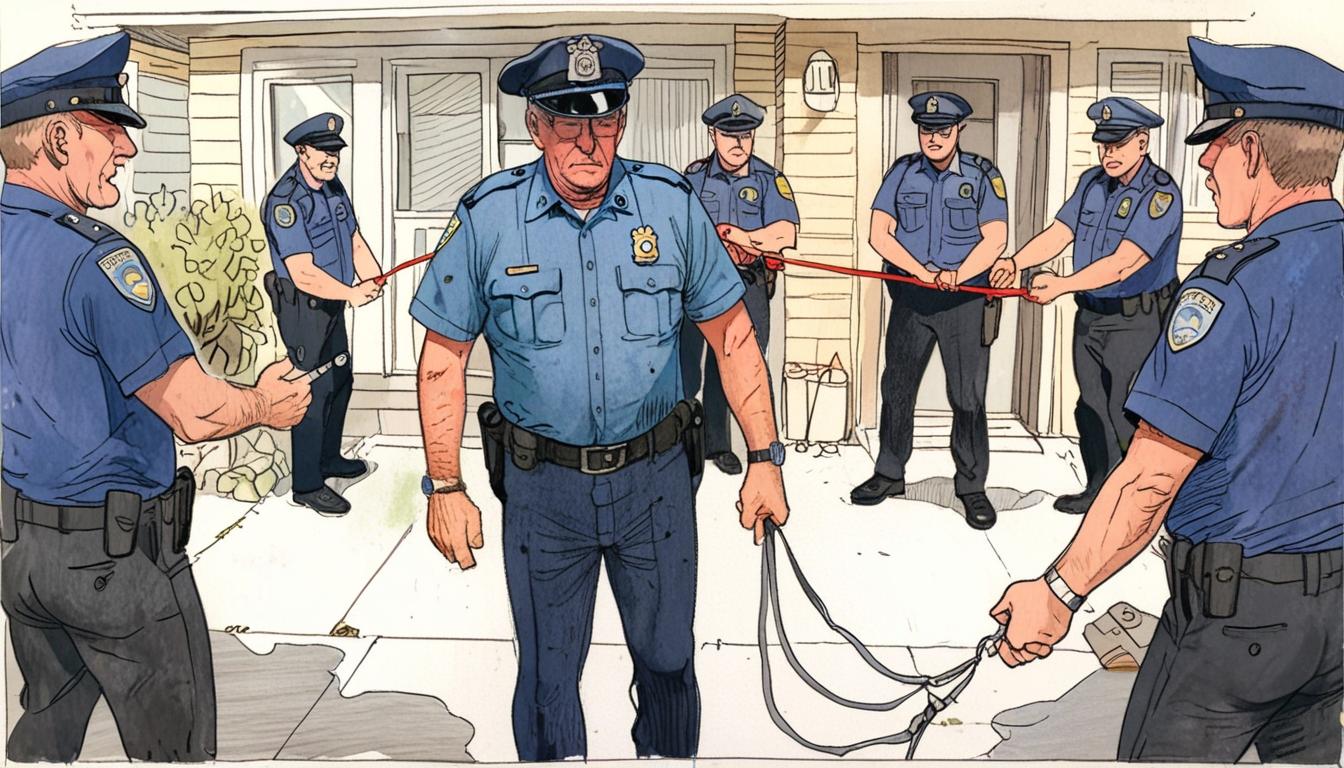Police have come under intense scrutiny following the arrest of a retired officer who was handcuffed at his home for a social media post warning of escalating anti-Semitism in the UK. Julian Foulkes, formerly of Kent Police, expressed his concerns in a tweet during a time when pro-Palestinian protests were gaining momentum after the tragic events in Gaza and Israel. The actions of the police, particularly the six officers who arrived at his home equipped with batons and pepper spray, have raised serious questions about the priorities and approaches taken by law enforcement in the face of perceived 'thought crimes'.
Foulkes, aged 71, was 'shocked' and 'flabbergasted' as he found himself arrested on his doorstep. Kent Police have since acknowledged the distress caused by their actions, offering an apology and retracting the caution they initially imposed on him. Responding to this incident, shadow home secretary Chris Philp emphasised that the police should focus on tangible crime rather than policing speech on social media. His sentiments resonated with many who have noted a disturbing trend where police resources seem increasingly devoted to monitoring what has been termed 'online offences.'
This incident is not isolated; rather, it reflects a broader climate of police involvement in social media discourse. In recent months, individuals—including writers, parents and public figures—have faced police intervention over comments made online. The term 'thought crime', originally coined in George Orwell's dystopian novel "1984", has become a point of reference for critics who argue that the policing of speech is eroding freedom of expression.
The crackdown has led to public outcry, as Toby Young, leader of the Free Speech Union, highlighted how petty crime is neglected while the police pursue those expressing unpopular opinions. He described the police as becoming the "paramilitary wing of the BBC", denouncing the approach taken towards ordinary citizens who are merely voicing their thoughts. This reflects a growing sentiment that the police’s focus on policing opinion betrays their fundamental purpose.
Foulkes’ ordeal began with his response to an online post that he interpreted as dangerously provocative. Following the escalation of protests in reaction to the crisis in the Middle East, he felt compelled to express his concerns, only to find his tweet flagged by the Metropolitan Police Intelligence Command. The subsequent events, including being detained for several hours and subjected to a detailed search of his home, have left him grappling with feelings of betrayal by the institution he once served with dedication.
Reports of similar punitive measures against individuals for social media exchanges have surfaced frequently. For instance, in one notable case, a couple was arrested after they shared allegedly offensive messages in a WhatsApp group regarding their child's school. Their encounter with the police led to significant psychological stress and public concern over the ramifications of such actions. Another teacher was detained and questioned over confiscating iPads from her children, a clear overreach that has been condemned as indicative of an emerging police state.
Even the former Home Secretary Suella Braverman underscored the absurdity of these police actions, reminding the public that freedom of speech is under threat. Describing the situation as a crisis, she claimed that the police's involvement in investigating what are deemed 'non-criminal' matters is both dangerous and counterproductive.
With the Kent Police's internal review promising to identify "learning opportunities" from these incidents, many are left wondering whether this will translate into meaningful change. The growing chorus of calls for police to return to traditional methods of crime prevention resonates strongly among the public, signalling a demand for law enforcement to reassess its priorities in an era where speech is being increasingly regulated.
Foulkes remains sceptical, expressing concerns about a 'woke mind virus' affecting societal norms, including law enforcement itself. As discussions surrounding online conduct and the responsibilities of policing in the digital age continue to evolve, the incident serves as a stark reminder of the delicate balance between maintaining public safety and upholding civil liberties.
In a statement following the apology, Foulkes quipped, “I saw Starmer in the White House telling Trump we've had it in the UK for a very long time, and I thought, 'Yeah, right'.” This sentiment encapsulates the frustrations felt by many who believe that recent events herald a troubling shift towards authoritarian practices in what was once viewed as a bastion of liberal democracy.
As the conversation around free speech in the UK intensifies, the examples of excessive policing in reaction to social media comments serve to highlight the complexities and challenges facing modern law enforcement in an increasingly digital and outspoken society.
Reference Map
- Paragraphs 1-3
- Paragraphs 4-5
- Paragraphs 6-7
- Paragraph 8
- Paragraph 9
- Paragraph 10
- Paragraph 11
- Paragraph 12
- Paragraph 13
- Paragraph 14
Source: Noah Wire Services
